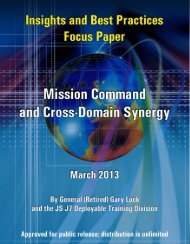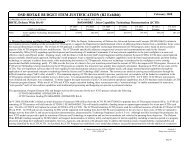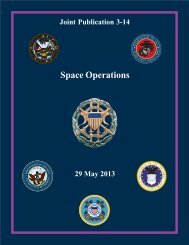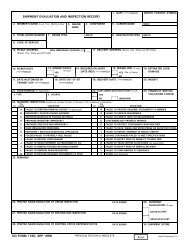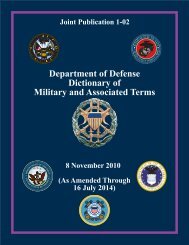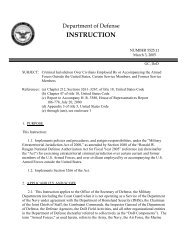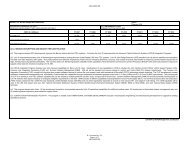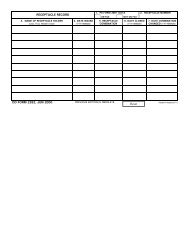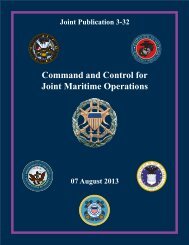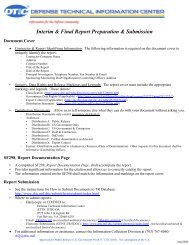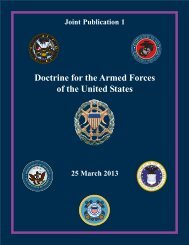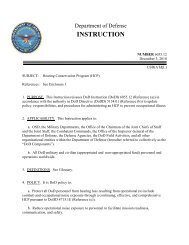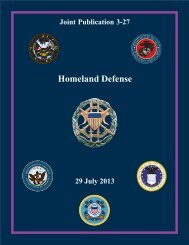JP 3-16, Multinational Operations - Defense Technical Information ...
JP 3-16, Multinational Operations - Defense Technical Information ...
JP 3-16, Multinational Operations - Defense Technical Information ...
You also want an ePaper? Increase the reach of your titles
YUMPU automatically turns print PDFs into web optimized ePapers that Google loves.
Planning and Execution Considerations<br />
operational, and tactical) should be a consideration during planning and throughout<br />
execution.<br />
b. Communications requirements vary with the mission, size, composition, geography,<br />
and location of the MNF. It is critical that operations and communications planners begin<br />
the coordination process early to ensure both US and MNF communication requirements are<br />
identified and sourced prior to operations. Interoperability is often constrained by the least<br />
technologically proficient participant. Effective communications support enables control<br />
over diverse, widely dispersed air, maritime, ground, and space elements. Access to both<br />
military and commercial satellites should be an early planning requirement to support widely<br />
dispersed elements. The MNFC should address the need for integrated communications<br />
among all participating forces early in the planning phase of the operation. MNF planning<br />
and technical communications systems control centers should be established as soon as<br />
possible to coordinate all communications.<br />
For more information regarding frequency management, refer to <strong>JP</strong> 6-01, Joint<br />
Electromagnetic Spectrum Management <strong>Operations</strong>.<br />
c. In all multinational operations a broadband, unclassified network will be a critical<br />
requirement for multinational coordination with all actors within the MNF OA. The IHC<br />
and affected nations’ governments and militaries will normally use unclassified,<br />
commercially encrypted networks as their primary collaboration and coordination tool. US<br />
forces should be able to integrate with MNFs to support collaboration needed to conduct<br />
multinational operations. US forces should expect to use SIPRNET solely for US-specific<br />
communication and tasks not suitable for execution in a multination information sharing<br />
environment. Satellite access to broadband Internet capability must be planned as an<br />
operational necessity, if not currently available within the MNF OA.<br />
d. LNO teams should be sent to other MNF HQ to facilitate integration of operations.<br />
These LNO teams should deploy with sufficient communications equipment to conduct<br />
operations with their respective HQ. Consideration should also be given to possible<br />
degradation of communications due to the extended distances over which the MNF may<br />
operate and the impact of enemy exploitation of the electromagnetic spectrum. Urban<br />
operations present other difficulties due to interference from physical structures or frequency<br />
overlaps. Planning for communications support also includes provisions which allow<br />
execution of required communications under adverse conditions. Additionally, US law<br />
requires prior international and implementing agreements defining quid pro quo payments<br />
for allied use of the <strong>Defense</strong> <strong>Information</strong> Systems Network and military satellite<br />
communications assets.<br />
e. Secure C2 systems are vital to the execution of MNF operations to avoid conflict and<br />
increase mutual understanding. The goal of secure C2 interoperability within an MNF is to<br />
develop greater cooperation through improved technical capability, system interdependence,<br />
and SA in the OA.<br />
f. Communications Security Release to Foreign Nations Policy. Disclosing, releasing<br />
and transferring products or associated COMSEC information to foreign governments is<br />
III-21



